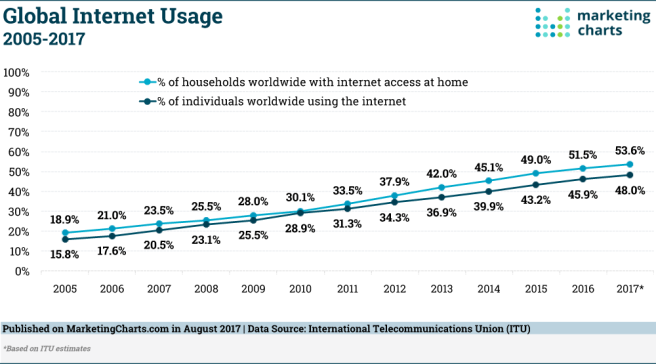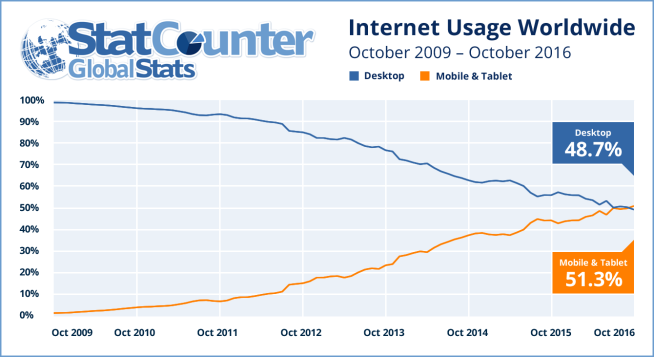
Over the last decade, there has been a drastic increase in (individual) internet users worldwide from 15.8% in 2005 to 48% in August 2017 (Marketing Charts, 2017). But what happened to the other 52% of the world population? Therefore, it is essential to discuss about digital differences such as inequalities and online practices, and its impacts.
Digital Inequalities
Involves people who could not access the internet due to social class/ economic status, social groups (including age gap), gender, physical disabilities, types of access and equipment availability.
Online Practices
Involves people who have good access to the internet but differ in online practices due to their beliefs, motivations, attitudes, cultural values, role in the family or society and the expectations placed upon them.
(Halford, Davies, & Dixon, 2017)
Impact on Online Interaction
Being a young adult who grew up in a developed country, the availability and freedom of usage of the internet is higher compared to a developing country. However, taking into account the online practices mentioned above, and also the fact that I grew up in an Asian family that values strong family relationships and good academic results, there will be limitations imposed towards how I access the internet for communication or learning purposes.
For example, the trend shown in the chart below depicts the increasing use of mobile phones and tablet to access the internet worldwide. However, as much as the increase in mobilization, my parents are strict when it comes to the usage of mobile phones during meal time, examination period and family gatherings.

(Statcounter, 2016)
On the other hand, my own set of beliefs also influence my interaction online. For instance, I actively shop online due to my set of beliefs that it is convenient, competitively-priced and saves time. Thus, these practices are personalized and determines a person’s online behavior.
More on Global Digital Statistics (Kemp, 2017):
Word Count: 300
References
Halford, S., Davies, H., & Dixon, J. (2017, November 10). 1.11 Digital differences – inequalities and online practices. Retrieved from Future Learn: https://www.futurelearn.com/courses/learning-network-age/3/steps/263012
Kemp, S. (2017, August 10). 3 Billion People Now Use Social Media. Retrieved from We Are Social: https://wearesocial.com/sg/blog/2017/08/3-billion-people-now-use-social-media
Marketing Charts. (2017, August 16). Almost Half the World is Now Online. Retrieved from Marketing Charts: https://www.marketingcharts.com/digital-79602
Statcounter. (2016, November 1). 2016 Press Release: Mobile and tablet internet usage exceeds desktop for first time worldwide. Retrieved from Statcounter: http://gs.statcounter.com/press/mobile-and-tablet-internet-usage-exceeds-desktop-for-first-time-worldwide



Hey Min Hui!
I found your post really informative and easy to understand as you managed to keep it succinct while emphasizing on the main points! I love how you elaborated examples with the presentation of graphs and videos.
However, one point that I found difficulty to relate is the restriction of phone usages. Although parents in Taiwan also value academic results strongly, they are not as strict as your parents when it comes to using mobile phones during examination especially regarding to the “limitations” imposed on how you use the internet for communication and even “learning purpose”.
In my case, since I was in the elementary school, my parents always found tons of online teaching materials related to academic topics such as animation video that taught mathematical progression in a fun and interesting way to teach me math or science, and the result is, those knowledge remain vividly in my brain until now and it helped to compensate for learning difficulties, and most importantly, I was able to retrieve information needed by utilizing the Web since I was little.
They are more like encouraging, suggesting me the way I should take advantage on the internet instead of restricting and imposing rules on me.
What’s your opinion and what would you do to your kids in relation to the points I mentioned above since we are in an era of digital media, meaning it’s important to prepare our children for digital literacy to acquire both cognitive and technical skills as supported by this article.
I’m more than excited to hear that!
LikeLiked by 1 person
Hi Luna,
Thank you for sharing your thoughts and opinions with me, it’s good to see that your parents value digital literacy even when you were at such a young age.
In regards to the usage of mobile phones during examinations, there is a valid explanation in contrast to the education system between Taiwan and Singapore. According to my understanding of the education system in Taiwan, there are no major tests or examinations in elementary to advance to a junior high school. On the contrary, Singaporean students are put on immersed stress from the compulsory examination, PSLE (Primary School Leaving Examinations). The results of the examinations will determine whether the child has the capability to enter a good or reputable school. Thus, some parents have the “kiasu” (afraid to lose) attitude typical of a Singaporean, resulting in heavy loads of tuition homework in addition to the homework that are given by the schools. Although the system exposes kids to critical-thinking skills and knowledge, it has been under constant criticism by both parents and educators from the amount of stress given to a 12-year-old kid. Therefore, my parents might have also been “blinded” by the competitiveness that they focused primarily on written-based homework, forgetting that there are also other means of learning.
For better understanding of the above, I have attached a link for you.
As for the question about what I would do if I had a kid, I would agree with your parents’ way of teaching, as it is important for kids to be exposed to digital media at a young age to acquire the skills you have mentioned above.
What about you? What would you have done differently if you were my parents dealing with the PSLE?
Looking forward to hearing from you!
Min Hui
LikeLike
Hello Minhui!
Great work on your blog post, I like that it is very easily understood and it has a clean sleek touch to it!
I have mentioned in my blogpost that I felt that in the past, technology was stationary. One of the graphs in your post from (Statcounter, 2016), is the accurate representation of what I was trying to relay. Now that technology is portable with our smart devices, I was wondering if you could share what are some of the measures your parents took about the usage of mobile devices as you mentioned in your post. Did it have any positive or slight negative impact on you?
I agree with you that our own set of beliefs does influence our digital differences. Likewise, I shop online too as I believe that it saves time. I especially like websites like trivago that compare prices of hotel prices for us instead of hassling over messy brochures at travel fairs!
LikeLiked by 1 person
Hello Pearl!
Thank you for leaving a comment. To answer your question, what my parents used to do back in the days were to confiscate my phone during perhaps an examination period. I am not allowed to have them back until after the examinations are over. These are done to minimized distraction from the phone when I was younger but I thought it was being unfair to me. However, I had learned to appreciate their effort now that I’m older, and also the fact that I indeed got better grades without using phones or computer during that period. What about you? Does your parents do the same as mine?
Yes, indeed shopping at physical stores could sometimes waste too much time and effort while shopping online can be at your own comfort and time. Guess this might be the reason why many are hooked onto online shopping right?
LikeLike